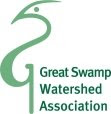Great Swamp Watershed Association (GSWA) is pleased to announce the schedule of appearances and topics for its Spring 2014 Breakfast Briefing Speakers Series.
GSWA created the Breakfast Briefing Series to help area residents stay informed about important environmental issues affecting their lives. Briefings take place early in the morning in order to minimize overlap with most traditional business hours. Presentations are kept brief; and coffee, tea, and a continental breakfast are always served free of charge. Unless noted otherwise, all briefings take place between 8:00 a.m. and 9:30 a.m. at GSWA’s headquarters located at 568 Tempe Wick Road in Morristown, NJ.
Support for GSWA’s Spring 2014 Breakfast Briefing Series comes from Investors Bank of Madison, located at 16 Waverly Place in Madison, NJ.
On Tuesday, March 11, Peter Coviello, of the Madison-based landscaping firm Coviello Brothers Horticultural Services, offers home owners some tips for growing a healthy and environmentally friendly lawn this spring. Drawing on his family’s 40 years of experience in the landscaping business, Peter will show how careful decision making about landscaping technique, lawn care products, and irrigation can build turf that is beautiful, easy and inexpensive to maintain, and less damaging to nearby rivers, lakes, and streams. An extensive discussion session will follow the presentation, so participants are encouraged to come prepared with their own questions about lawn care.
On Tuesday, April 8, David Kluesner, team leader for community affairs for the U.S. Environmental Protection Agency (EPA) Region 2, will discuss his organization’s work on a plan to clean up the last eight miles of the Lower Passaic River. Sediments found along this stretch of river are contaminated with PCBs, dioxins, pesticides, mercury, and other hazardous substances that pose a serious threat to public health and wildlife populations. As EPA develops its plan, the agency will need to effectively address several important issues concerning urban water degradation, environmental justice, and legal compliance. This presentation will outline some of these issues; as well the important role community involvement will play in shaping EPA’s final decision making on cleanup activities along the Lower Passaic.
On Tuesday, May 20, Dr. Leland Pollock, Professor Emeritus of Biology at Drew University, will discuss findings from his 2013 study of bugs, worms, mollusks, and other small spineless creatures living in New Jersey’s Great Swamp Watershed region. Collectively referred to as macroinvertebrates, scientists observe changes in the populations of these aquatic creatures in order to measure the relative health and cleanliness of rivers, lakes, and streams. Dr. Pollock has studied macroinvertebrate wildlife in the streams of the Great Swamp for many years, and both the Great Swamp Watershed Association and the former Ten Towns Great Swamp Watershed Management Committee have used his data to inform short- and long-term environmental decision making. Conducted seven months following the devastation caused by Hurricane Sandy, this year’s study conclusions may offer some interesting insights on the long-term environmental impact of that storm.
Please note that this presentation is offered free of charge to all and will take place at Kemmerer Library, located at 19 Blue Mill Road in New Vernon, New Jersey. Kemmerer Library is in no way responsible for the content or views presented during this event.
On Tuesday, June 10, Tom Suro, an hydrologist and surface water specialist with the United States Geological Survey (USGS) New Jersey Water Science Center, will discuss his work on a pilot project designed to map inland flooding along the Passaic River Basin. This presentation will offer important information about flooding and flood dynamics for all New Jersey residents living along the western and northern reaches of the Passaic River and its tributary streams.
For driving directions and additional details about each event, please visit GSWA at GreatSwamp.org.
Voluntary donations to GSWA are sincerely appreciated. If you are not a GSWA member, please consider making a donation of $10 per adult at the time of your registration. (Suggested donation amounts for non-member children and family groups are available online.)
Seating is limited, so advanced registration is strongly recommended. To register or receive additional information, please visit GreatSwamp.org or call (973) 538-3500 x22.
Friday, March 7, 2014
New Jersey’s Great Swamp, Passaic River Focus of Upcoming Talks
Subscribe to:
Post Comments (Atom)



No comments:
Post a Comment